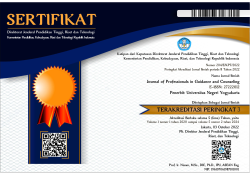The comparison of homogenous and heterogenous group in applying jigsaw method
Abstract
Jigsaw is a kind of cooperative learning methods. This method has been known as an effective method in schools either for junior or college students. This study aims to describe the differences between two groups, that are one group formed based on gender, ability, ethnic and another group formed as a homogenous. Both of groups were applying jigsaw method in educational psychology course. The research method was comparative design. The subject of this study are all students who enrolled in educational psychology course. The result of this study is the effectivity of both groups formed in the jigsaw method has no significant difference. So, to conclude this research, teachers in schools should more concern in group dynamic than the component of groups
jigsaw, heterogenous and homogenous group
Keywords
Full Text:
40-46References
Abdullah, R. (2017). Pengaruh Penerapan Model Pembelajaran Kooperatif Tipe Jigsaw pada Mata Pelajaran Kimia di Madrasah Aliyah. Lantanida Journal, 5(1), 13–28.
Adimassana, A., & Rusmawan, R. (2016). Eeftivitas Penerapan Model Pembelajaran Kooperatif Tipe Jigsaw Pada Mata Pelajaran IPS SD. Jurnal Penelitian, 20(2).
Allen, K.-A., & Kern, M. L. (2017). Individual Factors: Academic Motivation. In School Belonging in Adolescents (pp. 65–74). Springer.
Baharun, H. (2015). Penerapan Pembelajaran Active Learning untuk Meningkatkan Hasil Belajar Siswa di Madrasah. PEDAGOGIK: Jurnal Pendidikan, 1(1).
Chairunisa, E. D. (2014). Komparasi Estimasi Reliabelitas Pada Mata Pelajara Sejarah Ditinjau dari Homogenitas dan Heterogenitas Kelompok. JURNAL PENDIDIKAN ILMU SOSIAL, 24(2), 179–184.
Creswell, J. W. (2002). Educational Research: Planning, conducting, and Evaluating Quantitative. Prentice Hall Upper Saddle River, NJ.
Farhaini, D. (2017). Penerapan Model Pembelajaran Kooperatif Tipe Jigsaw pada Materi Kelarutan dan Hasil Kali Kelarutan untuk Meningkatkan Hasil Belajar Siswa SMA Negeri 9 Banda Aceh. UIN Ar-Raniry Banda Aceh.
Firidho, M. A. (2019). Studi Komparasi Penerapan Kelas Homogen dan Heterogen terhadap Motivasi Belajar di MA Al Fatich Surabaya. UIN Sunan Ampel Surabaya.
Gillies, R., & Ashman, A. (2003). Cooperative learning. Taylor & Francis.
Graham, S. (2015). Race and Academic Motivation.
Halimah, L., & Sukmayadi, V. (2019). The Role of" Jigsaw" Method in Enhancing Indonesian Prospective Teachers’ Pedagogical Knowledge and Communication Skill. International Journal of Instruction, 12(2), 289–304.
Holloway, S. S., Tilleman, S. G., Macy, R., Parkman, I. D., & Krause, A. J. (2008). Active Learning in Entrepreneurship: Applying The Jigsaw Method to Entrepreneurship Instruction. United States Association for Small Business and Entrepreneurship. Conference Proceedings, 1. Citeseer.
Johnson, D. W., & Johnson, R. T. (2011). Cooperative learning. The Encyclopedia of Peace Psychology.
Kolanczyk, D., & Arif, S. A. (2017). Impact of a Modified Jigsaw Method for Learning an Unfamiliar, Complex Topic. INNOVATIONS in Pharmacy, 8(3), 12.
Kumara, A. (2004). Model pembelajaran “Active Learning” mata pelajaran sains tingkat SD Kota Yogyakarta sebagai upaya peningkatan “Life Skills.” Jurnal Psikologi, 31(2), 63–91.
Looi, C.-K., Lin, C.-P., & Liu, K.-P. (2008). Group Scribbles to Support Knowledge Building in Jigsaw Method. IEEE Transactions on Learning Technologies, 1(3), 157–164.
Macpherson, A. (2015). Cooperative Learning Group Activities for College Courses. Surrey, BC Canada: Kwantlen Polytechnic University, 1–13.
Neno, H., & Erfiani, Y. P. F. (2018). The Effect of Jigsaw Method to Improve EFL Students’ Vocabulary Ability. Metathesis: Journal of English Language, Literature, and Teaching, 2(2), 171–183.
Nurbianta, N., & Dahlia, H. (2019). The Effectiveness of Jigsaw Method in Improving Students Reading Comprehension. ETERNAL (English Teaching Journal), 9(1).
Oakes, D. J., Hegedus, E. M., Ollerenshaw, S. L., Drury, H., & Ritchie, H. E. (2019). U sing the J igsaw M ethod to T each A bdominal A natomy. Anatomical Sciences Education, 12(3), 272–283.
Pateşan, M., Balagiu, A., & Zechia, D. (2016). The Benefits of Cooperative learning. International Conference Knowledge-Based Organization, 22(2), 478–483. De Gruyter Open.
Poloju, K. K., Rollakanti, C. R., & Manchiryal, R. (2018). Use of New Technique in Teaching and Learning-Jigsaw Method in Flipped Teaching.
Purnamasari, V., Yusmansyah, Y., & Rahmayanthi, R. (2015). Meningkatkan Kemampuan Berfikir Positif Melalui Layanan Bimbingan Kelompok Pada Siswa KelasXII. ALIBKIN (Jurnal Bimbingan Konseling), 4(2).
Silalahi, E. B. R. (2019). Jigsaw Method in Reading Comprehension. EnJourMe (English Journal of Merdeka): Culture, Language, and Teaching of English, 4(1), 11–17.
Slavin, R. E. (1988). Cooperative Learning and Student Achievement. In Educational Leadership (Vol. 46).
Sukmawati, I., Neviyarni, S., Syukur, Y., & Said, A. (2013). Peningkatan Hasil Belajar Melalui Dinamika Kelompok Dalam Perkuliahan Pengajaran Psikologi dan Bimbingan Konseling (PPBK). Pedagogi: Jurnal Ilmu Pendidikan, 13(2), 10–18.
Syahputra, E., & Suhartini, I. (2014). Increasing of Students’ Achievement in Polynomial by Using Jigsaw Method. Journal of Education and Practice, 5(5), 175–182.
Widiantono, N. (2017). Penerapan Model Pembelajaran Interaktif untuk Meningkatkan Aktivitas dan Hasil Belajar IPA Siswa Kelas 5 SD. Scholaria: Jurnal Pendidikan Dan Kebudayaan, 7(3), 199–213.
Winayawati, L., Waluya, S. B., & Junaedi, I. (2012). Implementasi Model Pembelajaran Kooperatif dengan Strategi Think-Talk-Write terhadap Kemampuan Menulis Rangkuman dan Pemahaman Matematis Materi Integral. Unnes Journal of Mathematics Education Research, 1(1).
Wulandari, S., Setyowani, N., & Mugiarso, H. (2012). Upaya Meningkatkan Empati dalam Berinteraksi Sosial Melalui Dinamika Kelompok Pendekatan Experiential Learning. Indonesian Journal of Guidance and Counseling:
DOI: https://doi.org/10.21831/progcouns.v1i1.30921
Refbacks
- There are currently no refbacks.

This work is licensed under a Creative Commons Attribution-ShareAlike 4.0 International License.
Supervised by:

Our journal indexed by:
ISSN 2722-6581 (print) || ISSN 2722-2012 (online)
ProgCouns Stats










